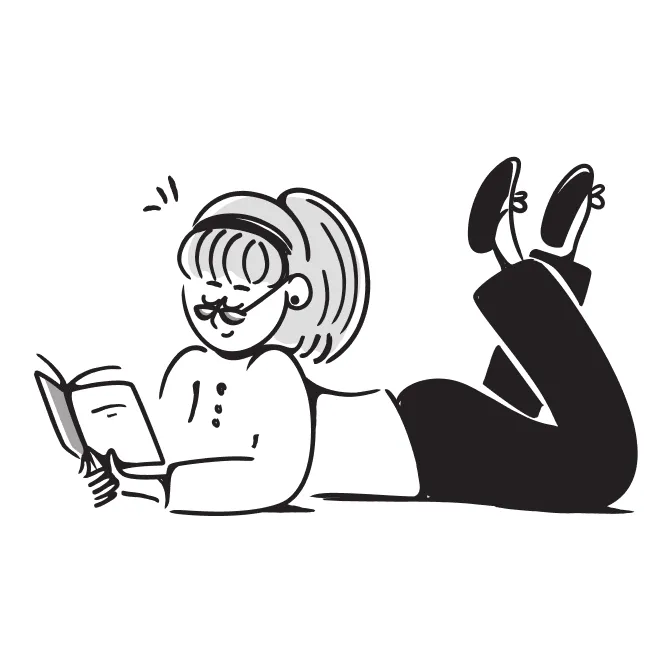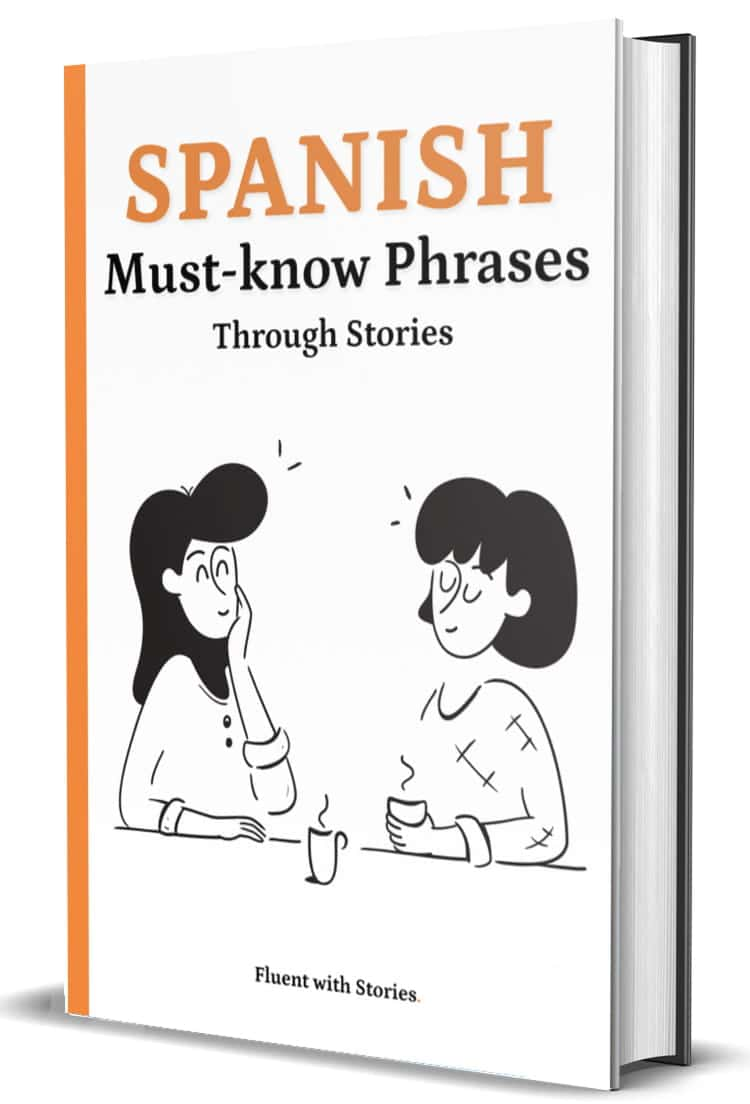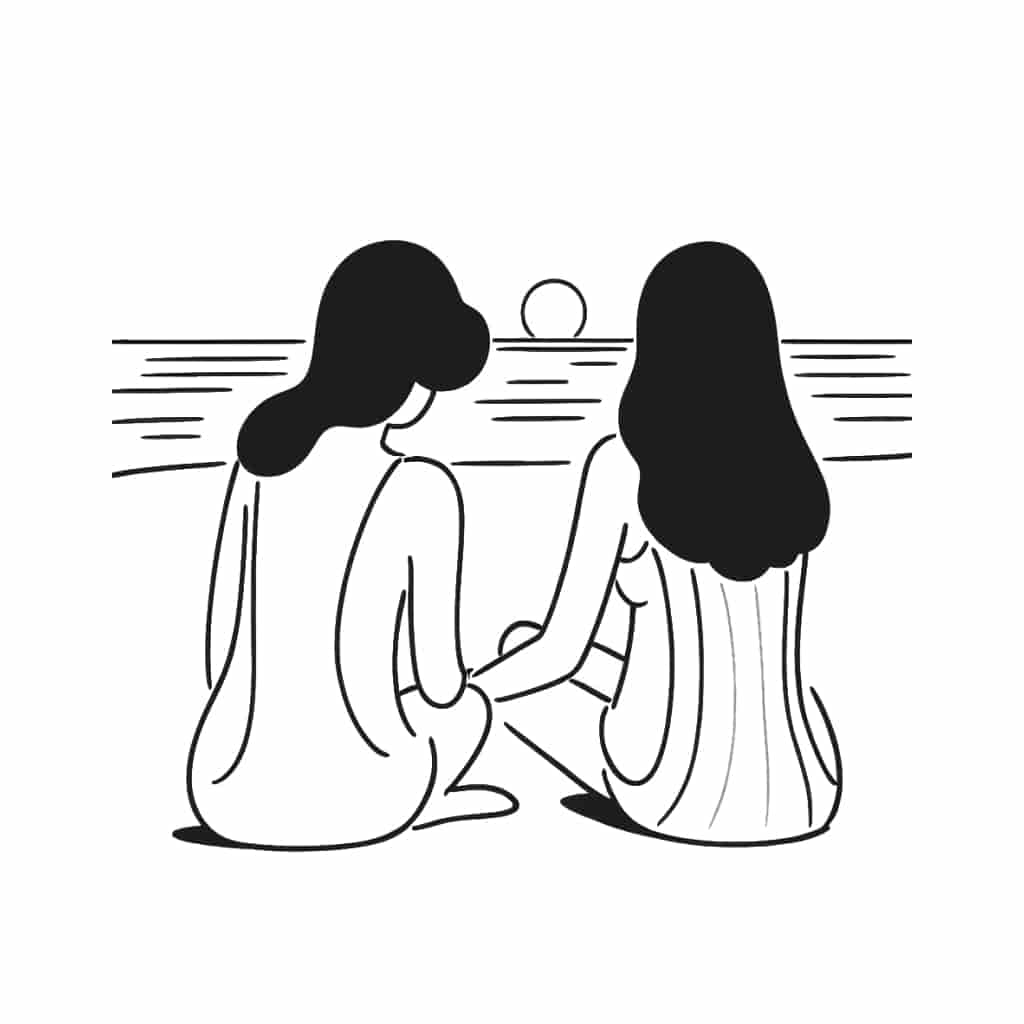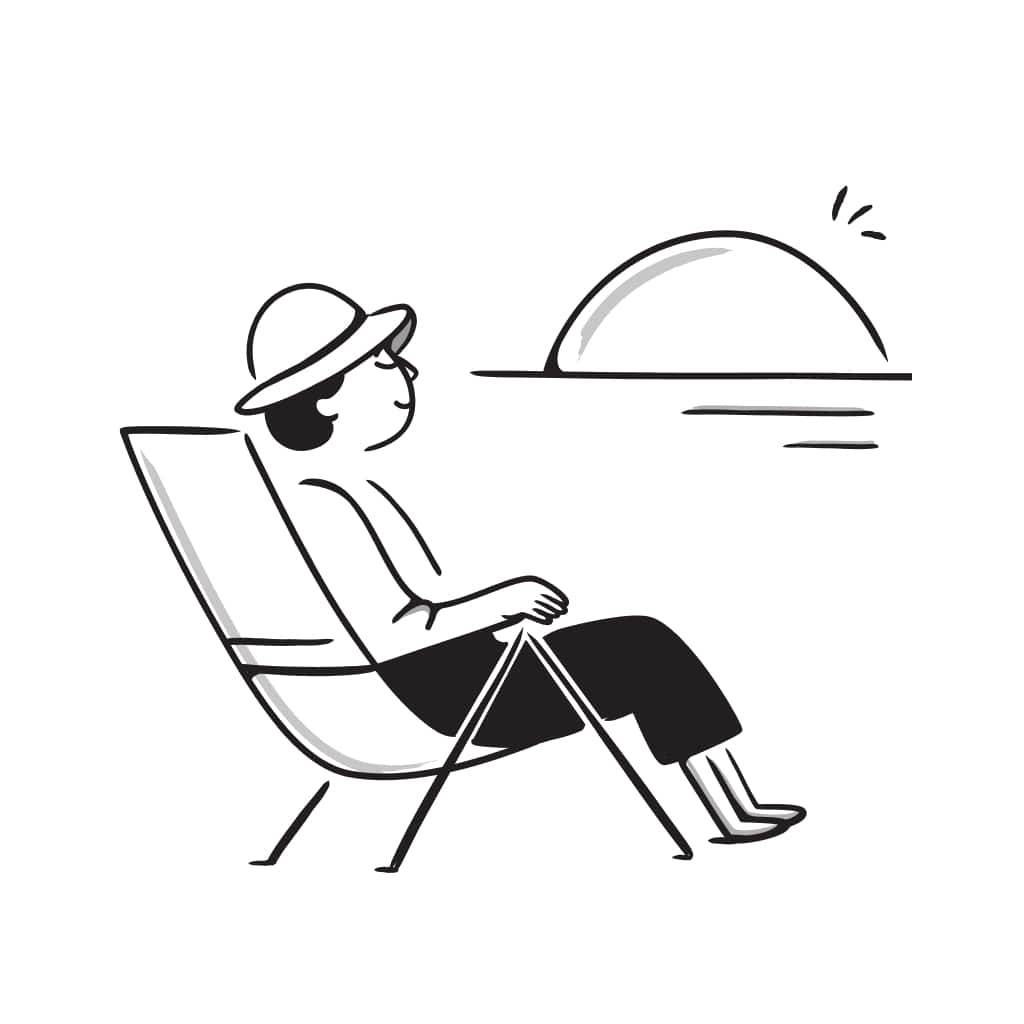This story was designed to help you learn Spanish in context, strengthen comprehension, and absorb vocabulary and grammar naturally through reading, listening, and interactive exercises. It includes a quizz, flashcards, and a writing practice to reinforce your skills. Here's how to maximize your learning:
- Listen and read the story
Play the audio while reading to follow the story naturally. Focus on understanding the main ideas and how the language sounds. The goal is to develop your Spanish listening skills and overall comprehension. - Read again with the translation
Turn on the translation and compare how ideas are expressed in Spanish and English. This builds awareness of Spanish sentence structure and grammar in real use. - Explore the key vocabulary
Below the story, you’ll find important words bolded and listed. This Spanish vocabulary list highlights key words and expressions in context and helps you understand what matters most in the story. - Take the comprehension quiz
Now test your understanding with the quiz. It reinforces the main ideas and helps improve your Spanish reading comprehension with instant feedback. - Review key vocabulary with flashcards
Use the flashcards to practice the vocabulary you just learned. This boosts memory through active recall and strengthens Spanish vocabulary retention. - Try the writing practice
Respond to the writing question related to the story. Use the new words and grammar to create your own sentences. This strengthens grammar and encourages you to think in Spanish. - Practice speaking out loud
Try saying full sentences out loud — or even read the whole story aloud if you feel ready. You can also speak along with the audio, matching the narrator’s voice as closely as possible. This is a great way to improve pronunciation and fluency while building your Spanish speaking confidence. - Review as needed
Come back to the story anytime to review vocabulary, grammar, or anything you found challenging. You can retake the quiz, replay the audio, or go through the flashcards again. Regular review helps reinforce what you’ve learned and build stronger Spanish skills over time.
Key Spanish concepts you'll encounter in this story
Grammar: Imperfect vs. preterite contrast, conditional expressions, complex time phrases , subjunctive in requests
Vocabulary: Immigration terminology, emotional expressions, household items, musical vocabulary, descriptive language for living conditions
Skills: Understanding character motivations, recognizing cause-effect relationships in narrative, interpreting cultural values, identifying emotional transitions in dialogues
Spanish version
En Venezuela ya no se podía vivir tranquilo. Cada día había peleas en las calles, la comida era escasa y los hospitales no tenían ni aspirinas.
Bianca tenía veintitrés años y estaba harta de tantos problemas. Su primo Luis le mandaba fotos de su vida en Málaga y ella soñaba con irse también.
Para pagar el vuelo, Bianca tuvo que vender todas las cosas que tanto le gustaban.
Al final solo pudo llevarse una maleta vieja con dos mudas y el collar de su abuela, lo único que le quedaba de ella desde que murió el año pasado.
El viaje duró casi día y medio y Bianca llegó por fin a Málaga. Estaba cansada pero feliz de haber salido de Venezuela.
En su mano llevaba un papel con la dirección de Luis.
Cuando encontró el portal y subió al piso, un señor mayor le abrió la puerta.
—Busco a Luis Martínez —dijo Bianca con una sonrisa.
—Aquí ya no vive —respondió el hombre—. Se fue hace unos quince días y no dijo adónde iba.
Bianca miraba a su alrededor sin poder creerlo. Estaba en España, sí, pero sola como un dedo. No conocía a nadie y los euros que le quedaban apenas daban para comer.
Tres noches en un hostal barato acabaron con sus ahorros. Ahora dormía en el parque, con miedo al frío y a los extraños que pasaban.
Una mañana, Bianca caminaba por el centro de Málaga cuando vio una tienda pequeña. Se llamaba "Melodías del Ayer" y vendía instrumentos usados.
En el escaparate había una guitarra vieja pero bonita.
Bianca sonrió al verla. Desde niña le encantaba cantar en fiestas y reuniones. "Quizás pueda ganar algo de dinero con música", pensó mientras miraba el precio.
Entró en la tienda con el corazón encogido. Una señora mayor la recibió con una sonrisa.
—Buenas tardes, ¿te puedo ayudar en algo?
—Quería... quería vender este collar —dijo Bianca—. Para comprar esa guitarra del escaparate.
Rosa tomó el collar y lo examinó.
—Es bonito, pero no vale tanto como para comprar la guitarra.
Los ojos de Bianca se llenaron de lágrimas. Era lo único que le quedaba de su familia.
—¿Por qué quieres la guitarra? —preguntó Rosa con curiosidad.
—Para cantar en la calle y ganar algo de dinero. En Venezuela siempre cantaba, dicen que lo hago bien.
Rosa miró a la joven con interés.
—¿Me cantarías algo ahora?
Bianca asintió y comenzó a cantar una canción tradicional de su país, sin acompañamiento. Su voz, clara y emotiva, llenó la pequeña tienda.
Rosa se quedó impresionada.
—Llévate la guitarra —dijo cuando Bianca terminó—. Y quédate con tu collar. Solo te pido que vengas a cantar aquí de vez en cuando para alegrar mi día.
Al cerrar la tienda esa noche, Rosa encontró a Bianca sentada en un portal cercano, abrazada a su guitarra.
—¿No tienes casa?
Bianca bajó la mirada y movió la cabeza. Luego le contó todo: cómo salió corriendo de Venezuela, el primo que ya no estaba, y esas noches horribles durmiendo en el parque.
—No puedes dormir ahí —dijo Rosa con firmeza—. Tengo un pequeño espacio en la trastienda. Es tuyo hasta que encuentres algo mejor.
Con el tiempo, una fuerte amistad creció entre ellas. Rosa le contó que nunca se había casado ni tenido hijos.
—Ahora tengo sesenta y ocho años y estoy cansada —confesó—. Quiero retirarme, pero mi pensión será muy pequeña y pago un alquiler alto. Y la tienda no da mucho dinero. Siempre quise tener mi propia casa para dejar de trabajar.
Bianca comenzó a cantar frente a la tienda cada tarde. Su música atraía a mucha gente que luego entraba a comprar.
Un día, alguien grabó a Bianca cantando y subió el video a internet. Se volvió viral. Un productor musical importante viajó desde Madrid para escucharla en persona.
—Tu voz es excepcional —le dijo después de oírla—. Quiero ofrecerte un contrato.
Seis meses más tarde, Bianca era una cantante conocida en toda España. Con su primer gran pago, compró dos casas vecinas en Málaga.
Bianca llevó a Rosa a ver una de esas casas. Era grande, con ventanas hacia el mar y un jardín lleno de flores.
—¿Te gusta esta casa? —le preguntó Bianca.
—Sí, me gusta mucho —respondió Rosa admirando el lugar—. ¿Es tu nueva casa?
—No, es tuya —dijo Bianca, entregándole los papeles—. Y mira, la casa de al lado es la mía. Vendré siempre que no esté de gira. Nunca más estaremos solas.
Rosa no pudo hablar de la emoción. Las lágrimas corrían por sus mejillas mientras abrazaba a Bianca con fuerza.
—Gracias, hija —susurró finalmente.
Se quedaron abrazadas en el jardín, contemplando su nuevo hogar. Rosa nunca había llamado "hija" a nadie, y Bianca no había escuchado esa palabra desde que dejó Venezuela.
Spanish story with English translation
En Venezuela ya no se podía vivir tranquilo. Cada día había peleas en las calles, la comida era escasa y los hospitales no tenían ni aspirinas.
In Venezuela, one could no longer live in peace. Every day there were fights in the streets, food was scarce, and hospitals didn't even have aspirin.
Bianca tenía veintitrés años y estaba harta de tantos problemas. Su primo Luis le mandaba fotos de su vida en Málaga y ella soñaba con irse también.
Bianca was twenty-three years old and was fed up with so many problems. Her cousin Luis sent her photos of his life in Málaga, and she dreamed of going there too.
Para pagar el vuelo, Bianca tuvo que vender todas las cosas que tanto le gustaban.
To pay for the flight, Bianca had to sell all the things she loved so much.
Al final solo pudo llevarse una maleta vieja con dos mudas y el collar de su abuela, lo único que le quedaba de ella desde que murió el año pasado.
In the end, she could only take an old suitcase with two changes of clothes and her grandmother's necklace, the only thing she had left of her since she died last year.
El viaje duró casi día y medio y Bianca llegó por fin a Málaga. Estaba cansada pero feliz de haber salido de Venezuela. En su mano llevaba un papel con la dirección de Luis.
The journey lasted almost a day and a half, and Bianca finally arrived in Málaga. She was tired but happy to have left Venezuela. In her hand, she carried a paper with Luis's address.
Cuando encontró el portal y subió al piso, un señor mayor le abrió la puerta.
When she found the building entrance and went up to the apartment, an older man opened the door.
—Busco a Luis Martínez —dijo Bianca con una sonrisa.
"I'm looking for Luis Martínez," said Bianca with a smile.
—Aquí ya no vive —respondió el hombre—. Se fue hace unos quince días y no dijo adónde iba.
"He doesn't live here anymore," the man replied. "He left about fifteen days ago and didn't say where he was going."
Bianca miraba a su alrededor sin poder creerlo. Estaba en España, sí, pero sola como un dedo. No conocía a nadie y los euros que le quedaban apenas daban para comer.
Bianca looked around in disbelief. She was in Spain, yes, but completely alone. She didn't know anyone, and the euros she had left were barely enough for food.
Tres noches en un hostal barato acabaron con sus ahorros. Ahora dormía en el parque, con miedo al frío y a los extraños que pasaban.
Three nights in a cheap hostel depleted her savings. Now she slept in the park, afraid of the cold and the strangers passing by.
Una mañana, Bianca caminaba por el centro de Málaga cuando vio una tienda pequeña. Se llamaba "Melodías del Ayer" y vendía instrumentos usados.
One morning, Bianca was walking through the center of Málaga when she saw a small shop. It was called "Melodies of Yesterday" and sold used instruments.
En el escaparate había una guitarra vieja pero bonita.
In the window display, there was an old but beautiful guitar.
Bianca sonrió al verla. Desde niña le encantaba cantar en fiestas y reuniones. "Quizás pueda ganar algo de dinero con música", pensó mientras miraba el precio.
Bianca smiled when she saw it. Since childhood, she loved singing at parties and gatherings. "Perhaps I can earn some money with music," she thought while looking at the price.
Entró en la tienda con el corazón encogido. Una señora mayor la recibió con una sonrisa.
She entered the store with a heavy heart. An elderly woman welcomed her with a smile.
—Buenas tardes, ¿te puedo ayudar en algo?
"Good afternoon, can I help you with something?"
—Quería... quería vender este collar —dijo Bianca—. Para comprar esa guitarra del escaparate.
"I wanted... I wanted to sell this necklace," said Bianca. "To buy that guitar in the window."
Rosa tomó el collar y lo examinó.
Rosa took the necklace and examined it.
—Es bonito, pero no vale tanto como para comprar la guitarra.
"It's beautiful, but it's not worth enough to buy the guitar."
Los ojos de Bianca se llenaron de lágrimas. Era lo único que le quedaba de su familia.
Bianca's eyes filled with tears. It was the only thing she had left from her family.
—¿Por qué quieres la guitarra? —preguntó Rosa con curiosidad.
"Why do you want the guitar?" asked Rosa with curiosity.
—Para cantar en la calle y ganar algo de dinero. En Venezuela siempre cantaba, dicen que lo hago bien.
"To sing in the street and earn some money. In Venezuela, I always sang, they say I do it well."
Rosa miró a la joven con interés.
Rosa looked at the young woman with interest.
—¿Me cantarías algo ahora?
"Would you sing something for me now?"
Bianca asintió y comenzó a cantar una canción tradicional de su país, sin acompañamiento. Su voz, clara y emotiva, llenó la pequeña tienda.
Bianca nodded and began to sing a traditional song from her country, without accompaniment. Her voice, clear and emotional, filled the small store.
Rosa se quedó impresionada.
Rosa was impressed.
—Llévate la guitarra —dijo cuando Bianca terminó—. Y quédate con tu collar. Solo te pido que vengas a cantar aquí de vez en cuando para alegrar mi día.
"Take the guitar," she said when Bianca finished. "And keep your necklace. I only ask that you come sing here from time to time to brighten my day."
Al cerrar la tienda esa noche, Rosa encontró a Bianca sentada en un portal cercano, abrazada a su guitarra.
When closing the store that night, Rosa found Bianca sitting in a nearby doorway, hugging her guitar.
—¿No tienes casa?
"Don't you have a home?"
Bianca bajó la mirada y movió la cabeza. Luego le contó todo: cómo salió corriendo de Venezuela, el primo que ya no estaba, y esas noches horribles durmiendo en el parque.
Bianca lowered her gaze and shook her head. Then she told her everything: how she fled Venezuela, the cousin who was no longer there, and those horrible nights sleeping in the park.
—No puedes dormir ahí —dijo Rosa con firmeza—. Tengo un pequeño espacio en la trastienda. Es tuyo hasta que encuentres algo mejor.
"You can't sleep there," Rosa said firmly. "I have a small space in the back of the store. It's yours until you find something better."
Con el tiempo, una fuerte amistad creció entre ellas. Rosa le contó que nunca se había casado ni tenido hijos.
Over time, a strong friendship grew between them. Rosa told her that she had never married or had children.
—Ahora tengo sesenta y ocho años y estoy cansada —confesó—. Quiero retirarme, pero mi pensión será muy pequeña y pago un alquiler alto.
"I'm now sixty-eight years old and I'm tired," she confessed. "I want to retire, but my pension will be very small and I pay high rent."
Y la tienda no da mucho dinero. Siempre quise tener mi propia casa para dejar de trabajar.
And the store doesn't make much money. I always wanted to have my own house so I could stop working.
Bianca comenzó a cantar frente a la tienda cada tarde. Su música atraía a mucha gente que luego entraba a comprar.
Bianca began singing in front of the store every afternoon. Her music attracted many people who then came in to shop.
Un día, alguien grabó a Bianca cantando y subió el video a internet. Se volvió viral. Un productor musical importante viajó desde Madrid para escucharla en persona.
One day, someone recorded Bianca singing and uploaded the video to the internet. It went viral. An important music producer traveled from Madrid to listen to her in person.
—Tu voz es excepcional —le dijo después de oírla—. Quiero ofrecerte un contrato.
"Your voice is exceptional," he told her after hearing her. "I want to offer you a contract."
Seis meses más tarde, Bianca era una cantante conocida en toda España. Con su primer gran pago, compró dos casas vecinas en Málaga.
Six months later, Bianca was a singer known throughout Spain. With her first big payment, she bought two neighboring houses in Málaga.
Bianca llevó a Rosa a ver una de esas casas. Era grande, con ventanas hacia el mar y un jardín lleno de flores.
Bianca took Rosa to see one of those houses. It was large, with windows facing the sea and a garden full of flowers.
—¿Te gusta esta casa? —le preguntó Bianca.
"Do you like this house?" Bianca asked her.
—Sí, me gusta mucho —respondió Rosa admirando el lugar—. ¿Es tu nueva casa?
"Yes, I like it very much," Rosa replied, admiring the place. "Is this your new house?"
—No, es tuya —dijo Bianca, entregándole los papeles—. Y mira, la casa de al lado es la mía. Vendré siempre que no esté de gira. Nunca más estaremos solas.
"No, it's yours," said Bianca, handing her the papers. "And look, the house next door is mine. I'll come whenever I'm not on tour. We'll never be alone again."
Rosa no pudo hablar de la emoción. Las lágrimas corrían por sus mejillas mientras abrazaba a Bianca con fuerza.
Rosa couldn't speak from emotion. Tears ran down her cheeks as she hugged Bianca tightly.
—Gracias, hija —susurró finalmente.
"Thank you, daughter," she finally whispered.
Se quedaron abrazadas en el jardín, contemplando su nuevo hogar. Rosa nunca había llamado "hija" a nadie, y Bianca no había escuchado esa palabra desde que dejó Venezuela.
They remained embraced in the garden, contemplating their new home. Rosa had never called anyone "daughter," and Bianca hadn't heard that word since leaving Venezuela.
Master A1 Spanish with 120+ stories
Start using Spanish in real life with our complete story-based course.
Join the waitlist for exclusive early-bird pricing.
Join waitlist

























Comments section for language learners